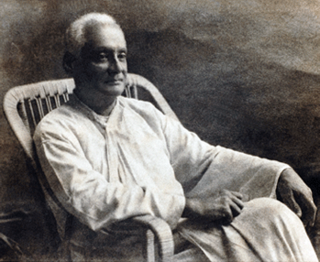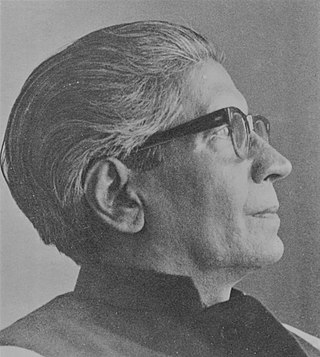Related Research Articles

Gaganendranath Tagore was an Bengali painter and cartoonist of the Bengal school. Along with his brother Abanindranath Tagore, he was counted as one of the earliest modern artists in India.

The Bengal Renaissance, also known as the Bengali Renaissance, was a cultural, social, intellectual, and artistic movement that took place in the Bengal region of the British Raj, from the late 18th century to the early 20th century. Historians have traced the beginnings of the movement to the victory of the British East India Company at the 1757 Battle of Plassey, as well as the works of reformer Raja Rammohan Roy, considered the "Father of the Bengal Renaissance," born in 1772. Nitish Sengupta stated that the movement "can be said to have … ended with Rabindranath Tagore," Asia's first Nobel laureate.
Sudeep Sen is an Indian English poet and editor.

Rabindranath Tagore was a Bengali polymath who worked as a poet, writer, playwright, composer, philosopher, social reformer and painter. He reshaped Bengali literature and music as well as Indian art with Contextual Modernism in the late 19th and early 20th centuries. Author of the "profoundly sensitive, fresh and beautiful" poetry of Gitanjali, he became in 1913 the first non-European and the first lyricist to win the Nobel Prize in Literature. Tagore's poetic songs were viewed as spiritual and mercurial; however, his "elegant prose and magical poetry" remain largely unknown outside Bengal. He was a fellow of the Royal Asiatic Society. Referred to as "the Bard of Bengal", Tagore was known by sobriquets: Gurudeb, Kobiguru, Biswokobi.

Suchitra Mitra was an Indian singer, composer, artist exponent of Rabindra Sangeet or the songs of Bengal's poet laureate Rabindranath Tagore, professor, and the first woman Sheriff of Kolkata. As an academic, she remained a professor and the Head of Rabindra Sangeet Department at the Rabindra Bharati University for many years. Mitra was a playback singer in Bengali films and was associated for many years with the Indian People's Theatre Association.

Nabaneeta Dev Sen was an Indian writer and academic. After studying arts and comparative literature, she moved to the USA where she studied further. She returned to India and taught at several universities and institutes as well as serving in various positions in literary institutes. She published more than 80 books in Bengali: poetry, novels, short stories, plays, literary criticism, personal essays, travelogues, humour writing, translations and children's literature. She was awarded the Padma Shri in 2000 and the Sahitya Akademi Award in 1999.
The Thakur family, with over three hundred years of history, has been one of the leading families of Calcutta, India, and is regarded as one of the key influencers during the Bengali Renaissance. The family has produced several persons who have contributed substantially in the fields of business, social and religious reformation, literature, art and music.

Sukanta Chaudhuri is an Indian literary scholar, now Professor Emeritus at Jadavpur University, Kolkata. He was educated at Presidency College, Kolkata and the University of Oxford. He taught at Presidency College from January 1973 to December 1991 and at Jadavpur University thereafter till his retirement in June 2010. At Jadavpur, he was founding Director of the School of Cultural Texts and Records, a pioneering centre of digital humanities in India. His chief fields of study are the English and European Renaissance, translation, textual studies and digital humanities. He has held visiting appointments at many places including All Souls College, Oxford; St John's College, Cambridge; the School of Advanced Study, London; University of Alberta, University of Virginia; and Loyola University, Chicago. He is an Honorary Fellow of the Asiatic Society, Kolkata and a member of the Executive Committee of the International Shakespeare Association. In July 2021, he was elected a Corresponding Fellow of the British Academy.

Supriya Chaudhuri is an Indian scholar of English literature. She is Professor Emerita at Kolkata's Jadavpur University.
Dilys Rose is a Scottish fiction writer and poet. Born in 1954 in Glasgow, Rose studied at Edinburgh University, where she taught creative writing from 2002 until 2017. She was Director of the MSc in Creative Writing by Online Learning from 2012 to 2017. She is currently a Royal Literary Fellow at the University of Glasgow. Her third novel Unspeakable was published by Freight Books in 2017.

Maitreyi Devi was an Indian poet and novelist. She is best known for her Sahitya Akademi Award-winning novel, Na Hanyate.
Alan Scott Riach is a Scottish poet and academic.

Pratima Devi (1893–1969) was an Indian Bengali artist, widely known for her artistic abilities. She was wife of Rathindranath Tagore. The poet took special interest in developing her capabilities.

Minakshi Datta is a Bengali educationist, writer, actor, translator and anthologist. An educator all her life, she is a widely recognized influence in the Kolkata and the New York literary and cultural circles. Married to fellow Bengali writer Jyotirmoy Datta, she is the mother of two children, Mallinath Datta, who was an IT professional, dramatist and filmmaker, and Kankabati Datta, who is an editor and a writer. Minakshi and Jyotirmoy Datta divide their time between Kolkata, India and Cherry Hill, New Jersey, USA.She also acted in a Bengali movie Banojyotsna directed by Dinen Gupta.

Prabhat Sangeet is a collection of Bengali poetry by poet Rabindranath Tagore. The book was first published in 1883 and was followed by Tagore's earlier work Sandhya Sangeet (1882). This works also marks the end of the second stage of Tagore's poetic career.

Abu Sayeed Ayyub was an Indian philosopher, teacher, literary critic and writer in both Bengali and English. Though born into a traditional, Urdu-speaking, Muslim family in Calcutta (Kolkata), he was so deeply captivated in his early teenage by the poems of the Indian Nobel Laureate Rabindranath Tagore that he taught himself Bengali so as to appreciate Tagore better. Later, when he started to write, it was mostly in his adopted language, Bengali. During the initial part of his writing career, Ayyub wrote on aesthetics, religion and socialism. However, it was his philosophical and scientific analysis of creative literature - in particular the poetry and the drama of Tagore - that finally brought him wide recognition as "one of the most serious and original Tagore scholars". Ayyub is also credited with "co-editing the first anthology of modern Bengali poetry". He taught philosophy at the University of Calcutta, the Visva-Bharati University and the University of Melbourne, and edited the literary and philosophical journal Quest.
Ranjana Ash was an Indian-born writer, literary critic, academic and activist, who was a leading advocate of south Asian and African writing. She moved in the 1950s to England, where she married American-born writer and broadcaster Bill Ash.
Rosinka Chaudhuri is Professor of Cultural Studies and also current Director at the Centre for Studies in Social Sciences, Calcutta (CSSSC). She is a member of St Hugh’s College, Oxford, and has held visiting positions at King's College London, Delhi University, Cambridge University and Columbia University.
Anna, Lady Geddes was an English social environmental activist, musician and partner in the work of Sir Patrick Geddes. During the marriage, she provided organizational and intellectual support to many of his projects, and they traveled extensively during their work together.

Swarnakumari Devi, also known as Swarnakumari Tagore, Swarnakumari Ghosal, Svarṇakumārī Debī and Srimati Svarna Kumari Devi, was an Indian Bengali writer, editor, essayist, poet, novelist, playwright, composer, and social worker.
References
- 1 2 3 4 "Professor Bashabi Fraser: Director of The Scottish Centre of Tagore Studies". Scottish Centre of Tagore Studies. Retrieved 12 November 2022.
- 1 2 3 "Bengal-born poet bags top UK honour". The Statesman . 25 January 2021. Retrieved 9 September 2022.
- 1 2 3 Chakrabarti, Debanjan (21 February 2021). "Rewriting colonial past through culture". The Telegraph . Retrieved 17 November 2022.
- ↑ "Bashabi Fraser, CBE". Royal Literary Fund . Retrieved 3 September 2022.
- ↑ "Editorial Board". Gitanjali and Beyond. Retrieved 3 September 2022.
- ↑ "Team members". Writers Mosaic. Retrieved 3 September 2022.
- ↑ Chatterji, Shoma A (15 July 2018). "Unbridled expression of inner-self". The Statesman . Retrieved 17 May 2023.
- ↑ "Staff recognised in New Year Honours". University of Edinburgh . Retrieved 3 September 2022.
- ↑ "Sturgeon makes saltire society list". Glasgow Times . 9 March 2015. Retrieved 6 November 2022.
- ↑ Upadhyay, Anjla (2003). "Review of With Best Wishes From Edinburgh Poetry collection". Indian Literature . Sahitya Akademi. 47 (2 (214)): 222–224. ISSN 0019-5804. JSTOR 23341409.
- ↑ Reviews of Rabindranath Tagore:
- Chatterji, Aditi (8 March 2021). "Traversing space with Rabindranath Tagore: Rabindranath Tagore, by Bashabi Fraser, London, Reaktion Books Ltd, 2019, 248 pp., £11.99 (paperback), ISBN 9781789141498". Postcolonial Studies : 1–3. doi:10.1080/13688790.2021.1894675. S2CID 233773530.
- Kämpchen, Martin (4 March 2022). "Critical lives: Rabindranath Tagore: by Bashabi Fraser, London, Reaktion Books, 2019, 248 pp., £11.99 (paperback), ISBN 9781789141498". Journal of Postcolonial Writing . 58 (2): 284–285. doi:10.1080/17449855.2021.1997227. S2CID 244905196.
- Sen, Sudeep (2 August 2019). "'The spoils of separation, the price of disentangling'". The Asian Age . Retrieved 17 May 2023.
- Mandal, Somdatta (3 April 2021). "Bashabi Fraser's Critical Lives: Rabindranath Tagore". The Daily Star . Retrieved 9 September 2022.
- ↑ Riach, Alan (7 February 2022). "Alan Riach: Poetry books to bring pleasure amid self-serving politics". The National . Retrieved 9 September 2022.
- ↑ Duncan, Lesley (21 February 2022). "Lesley Duncan - Poem of the week: We will meet again". The Herald . Retrieved 17 May 2023.
- ↑ "Poets launch anthology of Scottish and South Asian Poetry". The Scotsman . 24 August 2017. Retrieved 9 September 2022.